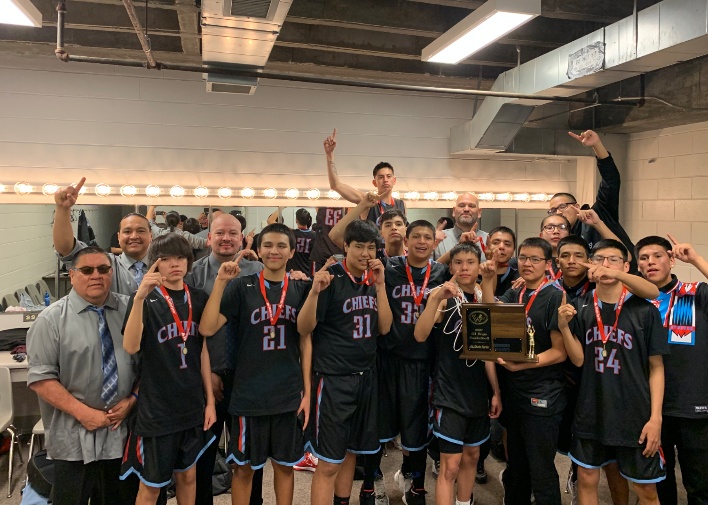By Dan Ninham (Oneida)
The Wyoming Indian High School boys’ and girls’ basketball teams very recently defended their state championships.
Craig Ferris is the head varsity boy’s basketball coach at Wyoming Indian High School, Ethete, Wyoming. He is Northern Arapaho/Northern Cheyenne. His Arapaho name is Beesbiii (Bas-Bee-e) meaning Big Feather.
Craig and his wife Marcia Ferris, a member of the Maori Tribe of New Zealand, live in Ethete, Wyoming, with their family of two boys aged 11 and 15 and 23 year old daughter.
Craig played at Wyoming Indian HS winning a state championship in 1992 and graduated in 1995. He played two years of ‘juco ball’ at Casper College winning a NJCAA Region 9 championship in 1996. He played two more years at NCAA DII Eastern New Mexico University in Portales.
Craig started coaching 5th/6th grade boys and girls in 2001 winning several conference championships. He moved to the HS Level in 2005 and in 15 years the teams have won six state championships including back to back in ‘09 and ‘10 and again in ‘19 and ‘20, two State Runner-ups, one 3rd place finish, and two 4th-place finishes.
Tribal core values as a coach comes from how basketball is a part of the community culture. “A lot of my players have had relatives who have played before them and by watching them play they wanted to follow in their footsteps and try to become Wyoming Indian Chiefs Basketball Players also,” said Craig. “I have two brothers who have played after me, Michael Hiwalker, who is also my Assistant/JV Coach, and Reland Hiwalker. That tradition of carrying on the family name has brought us a lot of success over the years. As a coach, I like to use that history to challenge and improve my player’s abilities. I ask them to work harder than the relative that has played before them and help honor their legacy within our program.”
“Over the years and after playing for many different coaches and different players I learned that effort and energy were what made these people successful,” said Craig. “Watching how they all prepared themselves for games and practices and how they focused on being good at the fundamental things like footwork, positioning and their basketball IQ. This helped me develop my philosophy of ‘You get good at the things you do the most’. Those are the things that I try and teach my teams every season by combining my attention to fundamental details to their talents and skill. It has worked out for us and has developed our program into what it is today.”
“I also include having a positive mentality when it comes to themselves and each other. I want them to understand that mistakes are going to be made and should be expected. We as a team need to be aware of that and must try to limit our mistakes while causing the other team to make as many mistakes as we can,” added Craig.
“Every person who I have played for and have played with have influenced my coaching career,” said Craig. “I give credit to my father, Gordon Hiwalker, for getting me involved in the sport in my younger days. Watching him play in independent tournaments and traveling all over Indian Country and how they made it look fun and challenging is what made me want to play the game myself. Since then I have taken things from all my hooping experiences and try it to teach them to my teams today.”
“Success, in my opinion, comes from the energy and effort you choose to put into the situation and adversity you are faced with,” said Craig. “If you choose to rise to the challenge and not give up and give everything you have into overcoming whatever it may be, you will not regret what the outcome is. This is what I teach my players and as we experience the different things throughout the season and also guide them through different coping skill they may experience. I offer my suggestions and sometimes create situations in practice that help them learn from mistakes so that when they are faced with them in a game or in life. In general, they have those tools to make a decision that is based on what they have experienced from before. Basically, success is not quitting and learning from our experiences while limiting repeated mistakes.”
“I am not into all the awards and accolades of the season,” said Craig. “I want to teach the game of basketball to my players and help them use that to hopefully better their lives for their families and futures. Teach them how to fight for themselves and to improve things for themselves.”
Photo Credit: Craig Ferris
